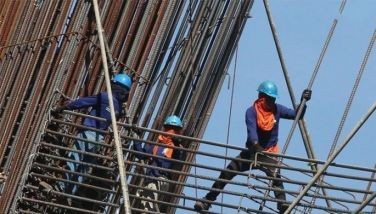Philippines still far from realizing demographic dividend
MANILA, Philippines — The Philippines is still far from realizing its demographic dividend as a large portion of its population is still made up of dependents, according to the National Economic and Development Authority (NEDA).
Latest data released by the agency, showed that out of the total population of 100.98 million Filipinos, those classified under the young age group number around 31 million. They are 15 years and below who are still dependents.
Those classified under the working age group stand at 64.1 million. They are aged 15 to 64 years old who are actively contributing to the economy.
The elderly age group or those who are 65 years old and above—number around 4.8 million.
Socioeconomic Planning Secretary Ernesto Pernia said that with its population structure, the Philippines remains in the first phase of the demographic transition.
This is a demographic phase characterized by a high young age population, high fertility rate, short life expectancy, and low economic growth and savings rate.
By 2020, the country is projected to have a population of almost 110 million Filipinos.
On the average, each Filipina has 2.7 children. Contraceptive use between the ages of 15 to 49 remain low at 40 percent.
On life expectancy, Filipino men are expected to live up to 69.6 years, while women are expected to live longer, reaching 75.9 years.
Pernia said working on reaching for demographic dividend is not an easy task. This, after all, entails effectively moving to the second phase of demographic transition characterized by a high working population, lower fertility rate, slightly longer life expectancy, high economic growth and higher income.
He said the road to demographic dividend is marked by challenges such as high fertility rate, particularly among poor households, and high unemployment rate among the youth.
“It is to the country’s advantage to make the best of the increasing labor force in order to boost economic output. But the government must invest in human capital through family health and educational interventions,” he said.
The Philippine Development Plan 2017-2022 emphasizes the need for a sustained universal health care program and reproductive health policies to reduce mortality and fertility rates.
NEDA said the country is expected to be the last major Asian economy to benefit from the demographic dividend between the years 2025-2070.
“If not properly addressed, the country would need to wait until at least 2050 to benefit from the demographic dividend, or possibly miss it all together,” said Pernia.
“We need to fully implement the RPRH Law to speed up the demographic transition. If fully implemented now, we should get there by 2025. When people are able to care for their reproductive health and plan for their families, they can save more and invest in their children better. This will lead to a population that is healthier and well educated,” he added.
NEDA earlier said it would be aggressive in its implementation of the Responsible Parenthood and Reproductive Health (RPRH) Law after Malacañang returned the Commission on Population (PopCom) under its wing.
President Duterte signed on Thursday Executive Order No. 71 renaming PopCom as the Commission on Population and Development (CPD) and reverting its attachment to NEDA from the Department of Health.
CPD is mandated to formulate and adopt coherent, integrated, and comprehensive long-term plans, programs, and recommendations on population and family planning as it relates to economic and social development.
“The time is ripe to lay down the foundation for the Philippines to harness its demographic dividend. It is imperative for both the public and private sectors to work together toward this goal today,” Pernia said.
- Latest
- Trending































